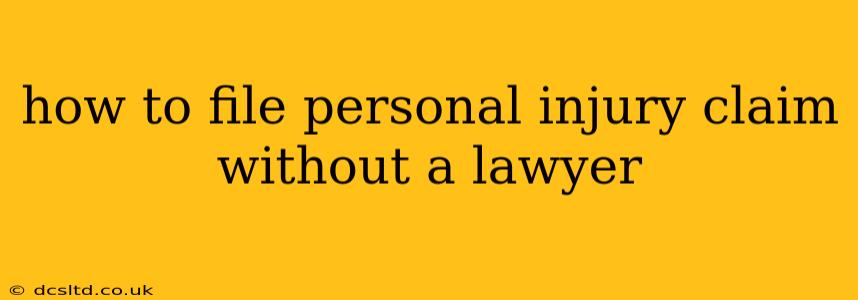Filing a personal injury claim without a lawyer can seem daunting, but it's entirely possible, especially for less complex cases. This guide will walk you through the process, providing the information and steps you need to navigate it successfully. Remember, while this information is helpful, it's not a substitute for legal advice. If your case is complex or involves significant injuries, consulting a lawyer is strongly recommended.
What is a Personal Injury Claim?
A personal injury claim is a legal process where you seek compensation for injuries and losses resulting from someone else's negligence or wrongful act. This could involve car accidents, slip and falls, medical malpractice, or dog bites, among others. The goal is to recover damages like medical bills, lost wages, pain and suffering, and property damage.
Can I Really File a Personal Injury Claim Without a Lawyer?
Yes, you can. Many simpler cases can be handled effectively without legal representation. However, the complexity of your case will significantly influence this decision. Factors to consider include the severity of your injuries, the amount of damages claimed, and the insurance company's willingness to negotiate fairly.
What are the Steps Involved in Filing a Personal Injury Claim Without a Lawyer?
Here's a step-by-step guide to help you navigate the process:
1. Gather Evidence:
This is crucial. Document everything meticulously. This includes:
- Medical records: Obtain all medical reports, bills, and treatment plans.
- Police reports: If applicable, get a copy of the police report from the incident.
- Photos and videos: Take pictures and videos of the accident scene, your injuries, and any damaged property.
- Witness information: Collect contact details of anyone who witnessed the accident.
- Repair bills: If there's property damage, gather repair estimates and receipts.
2. Notify the Insurance Company:
Contact the at-fault party's insurance company as soon as possible. Report the accident, providing them with the necessary information, including your contact details and a brief description of the incident. Keep a record of this communication.
3. Send a Demand Letter:
After gathering all your evidence, prepare a demand letter outlining your claim. This letter should clearly state:
- Your injuries and their impact on your life.
- Your medical expenses.
- Your lost wages.
- Other damages, such as pain and suffering.
- The amount of compensation you are seeking.
Keep your tone professional and factual. Attach supporting documentation to the letter.
4. Negotiate a Settlement:
The insurance company will likely respond to your demand letter with a counteroffer. Be prepared to negotiate. Know the value of your claim, and be firm but reasonable in your negotiations.
5. File a Lawsuit (If Necessary):
If negotiations fail to produce a satisfactory settlement, you may need to file a lawsuit. This is a more complex process that typically requires a deeper understanding of legal procedures. Consider seeking legal advice at this stage.
How Do I Calculate My Damages?
Calculating your damages accurately is crucial for a successful claim. Consider these elements:
- Medical expenses: Include all past, current, and anticipated future medical bills.
- Lost wages: Document your lost income due to your injuries.
- Pain and suffering: This is a more subjective component, and you may need to rely on case precedents or online resources for guidance.
- Property damage: Include repair costs or replacement value of damaged property.
What are the Common Mistakes to Avoid?
- Failing to document everything: Meticulous documentation is key to a strong claim.
- Speaking to the insurance company without legal advice: Be cautious about what you say.
- Accepting the first settlement offer: Explore all negotiation options before settling.
- Not understanding the statute of limitations: Each state has a time limit for filing a personal injury claim.
When Should I Hire a Lawyer?
If your case involves:
- Serious injuries
- Significant damages
- Complex legal issues
- Difficulty negotiating with the insurance company
It's advisable to seek professional legal assistance. A lawyer can provide expertise, negotiate on your behalf, and represent you in court if necessary.
This information is for guidance only and does not constitute legal advice. The specific requirements and procedures for filing a personal injury claim vary by jurisdiction. Always consult with a qualified legal professional for advice tailored to your specific circumstances.
